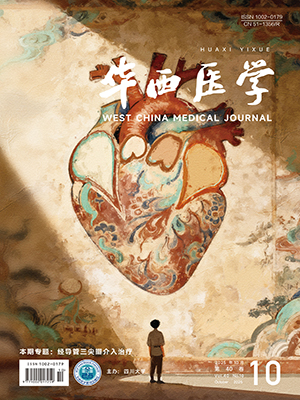| 1. |
《中国脑卒中防治报告》编写组. 《中国脑卒中防治报告 2020》概要. 中国脑血管病杂志, 2022, 19(2): 136-144.
|
| 2. |
屈云. 脑卒中生存质量健康因素康复现状问题与展望. 中国实用内科杂志, 2013, 33(8): 591-594.
|
| 3. |
Feigin VL, Owolabi MO; World Stroke Organization–Lancet Neurology Commission Stroke Collaboration Group. Pragmatic solutions to reduce the global burden of stroke: a World Stroke Organization-Lancet Neurology Commission. Lancet Neurol, 2023, 22(12): 1160-1206.
|
| 4. |
霍春暖, 张惠杰, 川原礼子. 脑卒中患者出院后生活场所的选择. 中国临床康复, 2004, 8(1): 101.
|
| 5. |
周珏. 社区康复治疗对脑卒中患者日常生活活动能力的影响分析. 国际全科医学, 2022, 3(2): 34-36.
|
| 6. |
中华神经科学会. 各类脑血管疾病诊断要点. 中华神经科杂志, 1996, 29(6): 379-380.
|
| 7. |
ZUNG WW. A self-rating depression scale. Arch Gen Psychiatry, 1965, 12: 63-70.
|
| 8. |
ZUNG WW. A rating instrument for anxiety disorders. Psychosomatics, 1971, 12(6): 371-379.
|
| 9. |
王娜, 孙济宇, 李艳玲. 脑卒中患者社会支持的有关研究. 医学研究杂志, 2010, 39(6): 99-102.
|
| 10. |
陈善佳, 周小炫, 方云华, 等. 日常生活活动能力量表在脑卒中康复临床使用情况的调查. 中国康复医学杂志, 2014, 29(11): 1044-1049.
|
| 11. |
张方, 傅书勇, 王曼, 等. 采用 SS-QOL 测量中国急性缺血性脑卒中患者生存质量和 BI 结果值的相关性研究. 中国药物经济学, 2010(3): 35-40.
|
| 12. |
Wei WE, De Silva DA, Chang HM, et al. Post-stroke patients with moderate function have the greatest risk of falls: a national cohort study. BMC Geriatr, 2019, 19(1): 373.
|
| 13. |
Goverover Y, Chiaravalloti ND, O'Brien AR, et al. Evidenced-based cognitive rehabilitation for persons with multiple sclerosis: an updated review of the literature from 2007 to 2016. Arch Phys Med Rehabil, 2018, 99(2): 390-407.
|
| 14. |
张少军, 刘杨, 杨海, 等. 绵竹地区后遗症期脑卒中患者抑郁状况的调查分析. 中华物理医学与康复杂志, 2022, 44(2): 171-175.
|
| 15. |
李世瑞, 张振香, 王文娜, 等. 环境因素对社区脑卒中患者康复自我效能的影响研究. 中国全科医学, 2024, 27(28): 3535-3539, 3545.
|
| 16. |
赵兵全, 高婷, 朱海娟, 等. 脑卒中后抑郁焦虑患者康复研究的计量学分析. 反射疗法与康复医学, 2024, 5(22): 89-93, 113.
|
| 17. |
张敏, 王倩, 赵海涛. 支持型自我管理模式对脑卒中抑郁患者的康复效果. 国际精神病学杂志, 2023, 50(5): 1205-1207.
|
| 18. |
贾杰. 脑卒中全周期康复的思考与策略. 中国全科医学, 2025, 28(2): 129-134.
|
| 19. |
汤龙, 郑拯, 饶阿敏, 等. 脑卒中社区康复管理模式与技术探讨. 中国全科医学, 2021, 24(15): 1932-1937.
|
| 20. |
Harel-Katz H, Adar T, Milman U, et al. Examining the feasibility and effectiveness of a culturally adapted participation-focused stroke self-management program in a day-rehabilitation setting: a randomized pilot study. Top Stroke Rehabil, 2020, 27(8): 577-589.
|
| 21. |
Sit JW, Chair SY, Chan Yip CW, et al. Effect of health empowerment intervention for stroke self-management on behaviour and health in stroke rehabilitation patients. Hong Kong Med J, 2018, 24 Suppl 2(1): 12-15.
|
| 22. |
高春华, 黄晓琳, 黄杰, 等. 自我管理对提高社区脑卒中患者日常生活活动能力及生活质量的效果. 中国康复理论与实践, 2014, 20(8): 789-793.
|
| 23. |
黄青青, 颜航, 黄培培, 等. 脑卒中病人自我管理模式的研究进展. 全科护理, 2021, 19(7): 905-909.
|
| 24. |
孙文佳. 基于授权理论的自我管理模式对脑卒中患者自我效能及自我管理能力的影响. 临床研究, 2020, 28(2): 186-187.
|
| 25. |
段宏为, 王筱筱, 王爱红. 自我管理项目对脑卒中患者生活质量和负性情绪影响的 Meta 分析. 中国全科医学, 2020, 23(2): 147-155.
|




